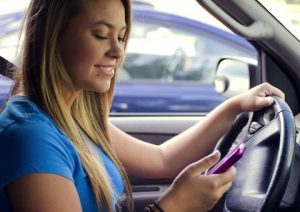Everyone who has ever taken a driver’s education course knows that taking your eyes off the road, even for a few seconds, can be a deadly mistake. Yet, somehow, drivers of all ages can’t seem to resist using their phones while driving. New research from across the country is beginning to shed light on why.

In 2013, research sponsored by AT&T found that even though 98% of drivers knew that texting while driving was dangerous, nearly half admitted to doing it anyway. In fact, more adults confessed to texting and driving than teens – 49% compared with 43%.
The problem is way bigger than texting, though. Americans find all sorts of ways to drive while distracted. In March, the National Safety Council found that among 2,400 drivers of all ages, 74% use Facebook while driving. In addition, 37% use Twitter, 35% use YouTube, and 33% use Instagram. Pokémon Go was not released until well after the study came out, but it's already being used behind the wheel.
Why do so many take the risk of driving while distracted? According to David Greenfield, founder of the Center for Internet and Technology Addiction, it has to do with how the human brain reacts to the ping or buzz that signals a new notification. Each ping gives the brain a shot of dopamine, which stimulates the reward pathways of the brain. “The dopamine reward centers are the same centers that have to do with pleasure from eating, pleasure from sex and procreation, pleasure from drugs and alcohol,” Greenfield told CNN. He added that a “reward” stimulus also inhibits access to the brain’s logical processors.
Personality also plays a key role in whether someone chooses to check his or her phone while driving. In April, the University of Alabama at Birmingham conducted surveys of both teenage and adult drivers. Both groups took personality profiles and then answered questions about distracted driving habits. Adult drivers who are outgoing and hyper-social are more likely to respond to messages behind the wheel. However, this isn’t true for teens. The study found conscientious and dependable teens were more likely to text and use the phone while driving.
“It may seem counterintuitive that conscientious teens would be the ones to participate in risky behavior,” said Morgan Parr, an undergraduate psychology student in the UAB Translational Research for Injury Prevention (TRIP) Laboratory. “However, it may be that these individuals feel the need to respond immediately to text messages from peers, even in a potentially dangerous context, such as driving in a car, in order to maintain peers’ perception of their dependability.”
No matter your personality, texting while driving is both dangerous and illegal under New York State’s distracted driving law (VTL 1225-d). Distracted driving includes more than just texting, however. Any use of a smartphone or other electronic device – including a camera or handheld GPS system – can result in a citation for distracted driving. Violations carry a fine of up to $400 and 5 points on your license for a first offense and consequences increase for subsequent citations.
If you or your conscientious teen has been ticketed for distracted driving or any other traffic offense, contact an attorney right away. Adam H. Rosenblum of the Rosenblum Law is an experienced criminal defense and traffic ticket attorney with offices in New York and New Jersey. Email him or call 888-203-2619 for a free consultation about your case.



